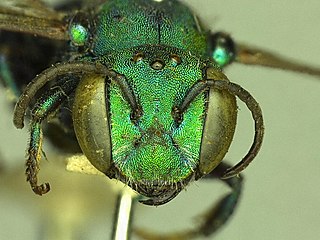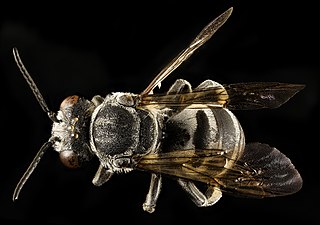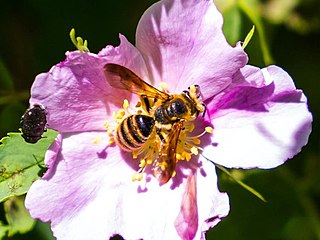Crabro cingulatus is a species of square-headed wasp in the family Crabronidae. It is found in Central America and North America.
Anthophora fedorica is a species of anthophorine bee in the family Apidae. It is found in North America.
Lasioglossum petrellum is a species of sweat bee in the family Halictidae.
Conanthalictus bakeri is a species of sweat bee in the family Halictidae. It is found in North America.
Andrena perarmata, the armed miner bee, is a species of miner bee in the family Andrenidae. Another common name for this species is the well-armed andrena. It is found in North America.

Auplopus mellipes, known as the red legged spider wasp, is a species of spider wasp in the family Pompilidae.

Colletes thoracicus, the rufous-chested cellophane bee, is a species of cellophane or plasterer, masked, or fork-tongued bee in the family Colletidae. It is found in North America.

Dufourea monardae, the monarda dufourea, is a species of sweat bee in the family Halictidae. It is found in North America. It is an oligolectic bee on bee balm plants.

The cherry leaf miner bee is a species of miner bee in the family Andrenidae. Another common name for this species is cherry plum miner. It is found in Central America and North America.

Stelis is a genus of kleptoparasitic cuckoo bees in the family Megachilidae. There are at least 100 described species in Stelis.
The lonely miner bee is a species of miner bee in the family Andrenidae. It is found in Central America and North America.

Ectemnius lapidarius is a species of square-headed wasp in the family Crabronidae. It is found in Africa, Europe and Northern Asia, North America, and Southern Asia.

Osmia foxi is a species of mason bees in the family Megachilidae. It is found in New Mexico and southeastern Arizona in the United States and in Sonora, Mexico.

Triepeolus donatus is a species of cuckoo bee in the family Apidae. It is found in North America.

The golden-haired miner bee is a species of miner bee in the family Andrenidae. The female bees are 8 to 10 mm in length, and males are 6 to 9 mm long. It is found in the western United States, and is relatively rare outside California. It looks very similar to the death camas miner bee but is smaller.
Epinysson basilaris is a species of insect in the family Bembicidae. It is found in Central America and North America.
Hoplisoides hamatus is a species of sand wasp in the family Bembicidae. It is found in North America.
Tachytes intermedius is a species of square-headed wasp in the family Crabronidae. It is found in Central America and North America.
Perdita rivalis is a species of mining bee in the family Andrenidae. It is found in North America.
Agathis is a genus of braconid parasitoid wasps. This genus was established by Latreille in 1804, and the type species is Agathis malvacearum Latreille, 1805. There are at least forty six species of Agathis in the western palearctic region.








